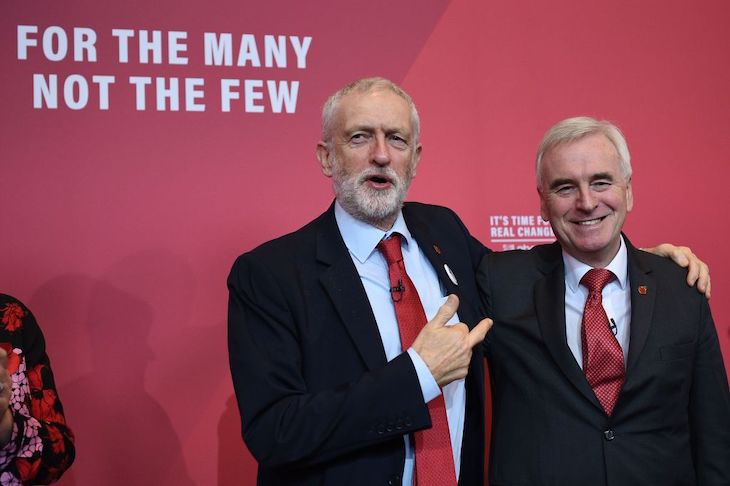The Labour plan to nationalise broadband is a good illustration of why the Corbyn-McDonnell team are much better at politics than their Conservative critics realise. It is also more evidence that the allegedly radical socialist Corbyn is actually engaged in an almost Blairite exercise of calculated branding and positioning.
If you read certain newspapers and listen to the mainstream Conservative narrative about Corbyn, you’ll hear that he is an economic radical intent on the biggest extension of state power into the private economy in modern British history. There is a lot in that narrative, but his Tory opponents should ponder the fact that Corbyn and his friends are actually quite happy to be accused of doing this. Generally if your opponent welcomes your attacks, you should stop and ask yourself whether what you’re doing is working.
Why does Corbyn welcome being painted as a dangerous radical? One reason is obvious: his base in the Labour Party supports him precisely because they think he is such a dangerous radical, a scourge of the privileged elite, etc etc. Every angry Telegraph headline, every furious CCHQ denunciation of his bearded Marxism is good for Corbyn internally.
But the second reason Team Corbyn welcome allegations of dangerous left-wing radicalism is that such labels help conceal the fact that some of the central elements of their programme are not left-wing radicalism that will liberate the poor but actually carefully-calibrated giveaways to much wealthier voters.
The most widely-recognised Labour policy of the 2017 general election was the promise to scrap university tuition fees. This would be a significant public subsidy to the middle classes. Higher education entry remains dominated by the children of parents on middle and high incomes. The poorest people, whom Corbynism purports to serve, don’t generally make it to university.
Nationalising the railways follows a similar pattern. Poor people don’t, by and large, travel by train; it’s too expensive and many of the places they tend to live don’t have a station. Poor people get the bus and yes, while Corbyn is one of the few national politicians who talks about bus travel, seizing the trains that so annoy better-off commuters is the focus of his transport offer.
The broadband promise fits the pattern too. I’ll leave aside the question of nationalising Openreach, beyond saying that Tories wanting to defend private ownership really should have given regulators the mandate and political backing to intervene in this market sooner. If you want people to have trust and confidence in market-delivered services, you need to empower regulators to deliver it; without that confidence, voters will be open to nationalisation.
The more important bit of the Labour offer on broadband is free broadband for all. This might well prove a politically popular offer, if voters have any trust in Labour to deliver it. It is, however, a stunningly bad policy – and bad even in Labour’s own terms.
Giving everyone in the country free broadband might cost somewhere between £20 and £100 billion a year, by the time you’ve connected up rural areas and assumed the operating costs of the commercial operators you’d drive out of business.
Even if you can ignore the vast questions about whether a state monopoly could provide a similar or better service than that offered by the market, why on earth would you chose to spend such a huge chunk of money on broadband of all things? The deadweight cost is enormous: the majority of the country is already paying for broadband. Most people can already afford to pay directly for something Labour is now offering to fund from taxation. Put more directly: I’m a higher-rate taxpayer. I can easily pay my monthly broadband bills. Why on earth should I be given broadband funded in part from the taxes levied on people working on the minimum wage? There is nothing progressive or fair about that.
Someone who was genuinely committed to the welfare of the poor could find a dozen better uses for spending the sort of sums involved in that broadband pledge: child poverty, social housing, housing benefit, homelessness. Or what about decarbonisation, or basic education, or children in care?
Meanwhile, taken at face value, Labour’s nationalisation plans would leave Brits paying for their water but not their internet connections. Is broadband really the most important thing for the state to provide for free, especially to the poor that Corbynism promises to help?
No, the only possible explanation for promising free tuition, cheaper rail fares and now free broadband to people who can already afford those things is cold political calculation. Labour is practising politics, not ideology. Shouting about Corbyn’s Marxism doesn’t just miss the target, it distracts from what he’s really up to.







Comments